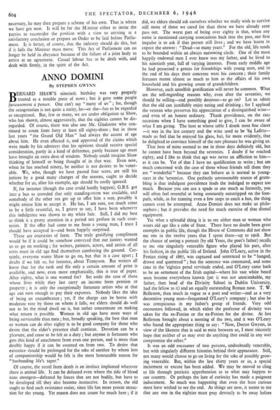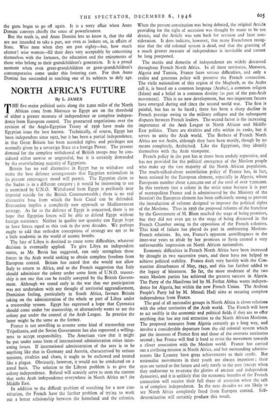ANNO DOMINI
By STEPHEN GWYNN
BERNARD SHAW'S ninetieth birthday was very properly treated as a notable piece of news ; but it gave some people furieusement a penser. One can't say "many of us " ; for, though the octogenarian is not quite a rarity, he—or she—has to be regarded as exceptional. But, few or many, we are under obligation to Shaw, who has shown, almost aggressively, that the eighties cannot be dis- regarded. Of course, there was also one Mr. Gladstone who con- tinued to count from forty at least till eighty-three ; but in those last years "the Grand Old Man" had always the accent of age about him. He even affected it, and approved of the claims which were made by his admirers that his opinions should receive special consideration, partly in a kind of deference, partly because age must have brought an extra dose of wisdom. Nobody could imagine Shaw thinking of himself or being thought of in that way. Even now, when he has reached ninety, he neither is nor desires to be vener- able. We, who, though we have passed four score, are still his juniors by a good many changes of the seasons, ought to decide whether for us, after his example, age should be coolly ignored.
If, for instance (though the case could hardly happen), G.B.S. got into a bus so crowded that only standing-room was available, and somebody of the other sex got up to offer him a seat, possibly it might amuse him to accept it. He has, I am sure, too much sense to be a little resentful, as, I grieve to say, I have been whenever this indulgence was shown to my white hair. Still, I did my best to think it a pretty attention in a period not profuse in such cour- tesies. If the offer had come to me from a young man, I trust I should have accepted it—and been happily surprised.
These are courtesies of form. The truly gratifying compliment would be if it could be somehow conveyed that our juniors wanted us to go on working ; for writers, painters, actors, and artists of all sorts must in old age find themselves cumbering the ground. Cer- tainly, everyone wants Shaw to go on, but that is a case apart ; I doubt if we felt so, for instance, about Tennyson. But writers all know that for the rank and file only a certain amount of print is available, and now, even more emphatically, this is true of paper. After eighty, what is one wanted for? Set aside the case of those whose lives while they last carry an income from pension or property ; it is only the exceptionally fortunate artists who at that age can earn enough to pay their expenses. Nobody likes the idea of being an encumbrance ; yet, if the charge can be borne with moderate ease by those on whom it falls, we elders should do well not to let the mind dwell on it, but rather concentrate on making what return is possible. Women in old age have more ways of being serviceable than men ; but, broadly speaking, the best that man or woman can do after eighty is to be good company for those who desire that the elder's presence shall continue. Devotion can be a pleasure, and cease to be felt as a duty ; but anyone is fortunate who gets this kind of attachment from even one person, and is more than doubly happy if it can be counted on from two. To desire that existence should be prolonged for the sake of another by whom loss of companionship would be felt is the most honourable reason for "husbanding life's taper."
Of course, the recoil from death is an instinct implanted wherever there is animal life. It can be defeated even where the tide of blood runs strongest—defeated by forces that are not bodily, but have to be developed till they also become instinctive. In reason, the old ought to find such resistance easier, since life has more potent attrac- tion for the young. Yet reason does not count for much here ; if it did, we elders should ask ourselves whether we really wish to survive still more of those we cared for than those we have already seen pass out. The worst part of being over eighty is that, when any name is mentioned carrying associations back into the past, our first impulse is to ask if that person still lives ; and we have learnt to expect the answer: "Dead—so many years." For the old, life tends to be bounded within an always narrowing circle. One of the most happily endowed men I ever knew was my father, and he lived to his ninetieth year, full of varying interests. From early middle age he had possessed a genius for friendships with young men, and to the end of his days their concerns were his concern ; their family fortunes meant almost as much to him as the affairs of his own household and his growing count of grandchildren.
However, such unselfish gratification will never be common. What are the self-regarding reasons why, even after the seventies, we should be willing—and possibly desirous—to go on? Let us admit that the old can justifiably enjoy eating and drinking ; for I applaud the veteran who preserves his appreciation of a distinguished wine— and even of an honest ordinary. Thank providence, on the rare occasions when I have something good to give, I can be aware of what I am giving. The host at whose table I drank most fine claret —it was in the last century and the wine used to be '64 Lafitte- made us feel that he enjoyed his glass, but, far more evidently, that he delighted to convince himself of the rare pleasure he was giving us.
That host of mine seemed to me in those days definitely old, but he cannot have been beyond the seventies. I doubt if he reached eighty, and I like to think that age was never an affliction to him— as it can be. Yet of that I have no qualification to write ; but am much concerned with the case of those whose friends tell them they are " wonderful " because they can behave as is normal to young- sters in the 'seventies. One perfectly unreasonable source of grum- bling is that indulgent providence leads the indulged to expect too much. Because you can use a spade or axe much as formerly, you will often feel resentful at being constantly outstripped on the foot- path, while, as for running even a few steps to catch a bus, the thing cannot even be attempted. Anno Domini does not make us philo- sophers ; but it provides the need for much exercise of that dismal equipment.
Yet what a splendid thing it is to see either man or woman who wears old age like a robe of State. There have no doubt been great examples in public life, though the House of Commons did not show me one in the twelve years that I spent there—up to 1918. But the chance of seeing a portrait (by old Yeats, the poet's father) recalls to me one singularly venerable figure who played his part, after his fashion, in the public life of Ireland. John O'Leary, active in the Fenian rising of 1867, was captured and sentenced to be "hanged, drawn and quartered " ; but the sentence was commuted, and some time in the 'eighties penal servitude ended, and O'Leary came back to be an ornament of the Irish capital—where his vast white beard soon became everywhere known (yet it was not unmistakable, my father, then head of the Divinity School in Dublin University, had the fellow to it) and an equally outstanding Roman nose. T. W. Rolleston, then much in vogue as a poet and writer—and as a very decorative young man—frequented O'Leary's company ; but also he was conspicuous in my father's group of friends. Very odd encounters followed, in which either the professor of divinity was taken for the ex-Fenian or the ex-Fenian for the divine. At last Rolleston brought about a meeting of the two, and it was O'Leary who found the appropriate thing to say: "Now, Doctor Gwynn, in view of the likeness that is said to exist between us, I most sincerely hope that neither of us may ever do anything that could in any way compromise the other."
It was an odd encounter of two persons, undoubtedly venerable, but with singularly different histories behind their appearance. Still, not many would choose to go on living for the sake of possibly grow- ing venerable. But, within the last thirty years or so, a special incitement or excuse has been added. We may be moved to cling to life through patriotic apprehension as to what may happen to our country. Or perhaps the lure of curiosity has made a poignant inducement. So much was happening that even the least curious must have wished to see the end. As things are now, it seems to me that any one in the eighties must pray devoutly to be away before
the guns begin to go off again. It is a sorry affair when Arno Domini conveys chiefly the sense of powerlessness.
But the truth is, and Arm Domini lets us know it, that the old are not intended to take a part, not even as lookers on, in affairs of State. Wise men when they are past eighty—but, how much oftener! wise women—fill their days very acceptably by concerning themselves with the fortunes, the education and the enjoyments of those who belong to their grandchildren's generation. It is a proud moment when even great-grandchildren or great-grandchildren's contemporaries come under this fostering care. For then Anno Domini has succeeded in teaching one of its subjects to defy age.



































 Previous page
Previous page